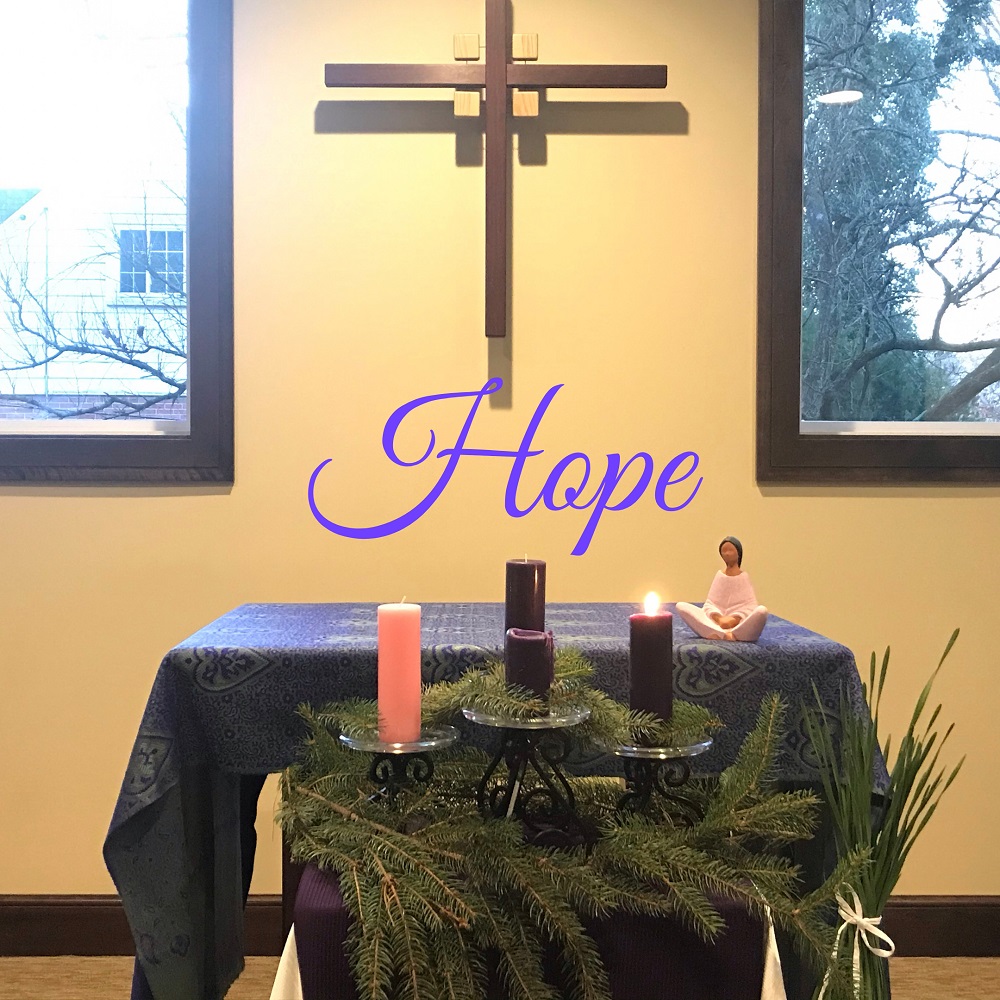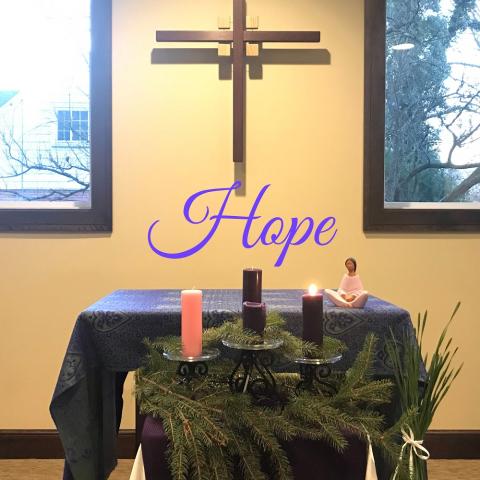
Our motherhouse chapel's Advent wreath (Nicole Trahan)

Our motherhouse chapel's Advent wreath (Nicole Trahan)
Advent. A season of hope. A season of peace, of joy, of love. And what of Advent 2020 — where is there hope? Where is there joy? Where is there peace? Love?
2020 certainly has been a year like none other in our lifetimes. "Unprecedented" was the word used countless times in the spring and summer, so much so that I could barely stand to hear reporters say it. And yet, it is actually the perfect word.
Unprecedented. Bizarre. Uncommon. Unusual. Unparalleled. That is exactly what this year has been.
We've seen death and loss in unfathomable numbers. We've seen destruction. Murders. Protests. Lies. A deeply divided nation. Vitriol in public discourse. A test of our democratic institutions. Joblessness. Rising food insecurity. International tensions. Wildfires. Hurricanes. All of this while having the added layer of not being able to hug those who mourn or seek the in-person comfort of friends and family outside of our household. Yes, "unprecedented" is perfect.
The Dec. 14 issue of Time magazine that arrived at our house in early December had an essay by Stephanie Zacharek that said: "The pandemic enforced a kind of communal isolation, framing a cascade of public catastrophes and injustices with loneliness." Indeed. Well said, Ms. Zacharek.
As depressing as the essay is, she ends with:
Americans are inherently optimistic. It's why our allies like us, even if they secretly mock us behind our backs — but we don't care! We're a nation with our thumbs perpetually stuck in our suspenders. Our optimism is our most ridiculous trait, and our greatest. It can't always be morning in America. Sometimes we have to get through the darkest hour just before. The aurora bides its time.
As we come closer to the end of 2020, many people are feeling more optimistic. People say, "This terrible year is almost over." There's a vaccine on the horizon. There's a new administration soon to be in leadership of our nation. Many people, it seems, have woken up to the problem of racial injustice and systemic racism. It's an opportunity for a fresh start. Yes. There are reasons to be optimistic.
Advertisement
In the midst of growing optimism, personally, I am looking for hope. I find myself reflecting on Psalm 146:3-4: "Put no trust in princes, in mere mortals powerless to save. When they breathe their last, they return to the earth; that day all their planning comes to nothing." This serves as a reminder to me to not place too much stock in the fleeting trappings of optimism.
Optimism is fleeting, lasting only as long as positive exterior circumstances are present or expected. Hope, like joy, however, is at a greater level of depth and is not based on what's happening in the world around us.
Recently, in our community morning prayer, we prayed with Psalm 43, which reads, "Why are you downcast, my soul? Why do you groan within me? Wait for God, whom I shall praise again, my savior and my God." Other translations read, "Hope in God, whom I shall praise again."
Sometimes, it can seem trite to say we should hope in God. In the midst of so much heartache and darkness, where is the comfort in this seemingly passive stance? It can seem naive at best and irresponsible at worst. As if to say we need to take a step back and let God do what God will do while we wait. And on some level, it's true. So much is outside of our control. And yet, hoping in God cannot be passive.
In the first reading for the second Sunday of Advent, Isaiah tells us:
Comfort, give comfort to my people, says your God. Speak tenderly to Jerusalem, and proclaim to her that her service is at an end, her guilt is expiated ... In the desert prepare the way of the Lord! Make straight in the wasteland a highway for our God! ... Fear not to cry out and say to the cities of Judah: Here is your God! ... Like a shepherd he feeds his flock; in his arms he gathers the lambs, carrying them in his bosom, and leading the ewes with care. (Isaiah 40:1-2a, 3b, 9c, 11)
God is bringing comfort. God is caring for God's people. The light of God is breaking into the darkness. But we have a role to play in this inbreaking of God. We are the ones through whom God gives comfort. We are the ones through whom God speaks tenderly. We make straight the paths.
In my experience, this is the source of hope — trust in the action of God coupled with our active participation in God's plan to raise the lowly, comfort the afflicted, make winding ways straight and valleys high.
[Marianist Sr. Nicole Trahan lives in Dayton, Ohio, and teaches sophomore religion at Chaminade Julienne Catholic High School. She is national director of vocations for the Marianist Sisters and director of the pre-novitiate program for her province.]





